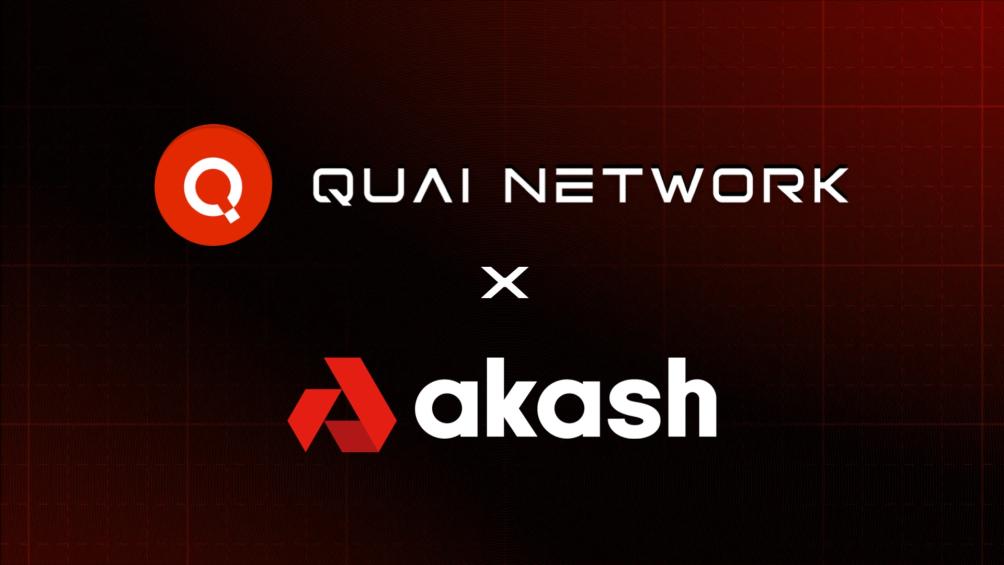
We are thrilled to announce our integration with Akash Network, bringing together two powerful forces in Web3: Quai’s scalable Proof-of-Work technology and Akash’s decentralized cloud computing platform. This collaboration opens up new possibilities for miners, developers, and users across the ecosystem.
Key features
Here is what this means for Quai miners, developers, and users:
- Miners now gain access to decentralized operations through Akash nodes, enabling wider participation across the network and enhancing network security.
- Developers receive streamlined access to a global compute marketplace, making it simpler than ever to deploy Quai services and dApps. The integration significantly reduces barriers to entry while providing enhanced scalability for projects]
- Users benefit from faster transaction processing, reduced network latency across the platform, and new economic opportunities through arbitrage within the dual-token system.
“This integration is about more than just connecting technologies—it’s about unlocking the full potential of decentralized infrastructure,” says Alan Orwick, Co-Founder of Quai Network. “We’re building something that delivers real value to everyone in our ecosystem.”
Greg Osuri, CEO of Akash Network, shares our vision: “At Akash, our mission is to democratize cloud computing, and Quai’s approach to scalable and decentralized blockchain aligns perfectly with that. Together, we’re addressing real challenges and building the foundation for a truly decentralized internet.”
The integration reflects our commitment to advancing decentralized infrastructure, providing real-world solutions for the blockchain ecosystem, and driving innovation across AI, Web3, and decentralized finance applications.
About Akash Network
Akash Network is a decentralized cloud computing platform providing developers with access to a global, distributed marketplace for compute resources. By enabling cost-effective and scalable cloud infrastructure, Akash is redefining cloud services for the decentralized age.
About Quai network
Quai Network is pioneering the future of blockchain technology as the first decentralized energy dollar built on a scalable, programmable Proof-of-Work blockchain. Through innovative Proof-of-Entropy-Minima consensus and merged mining capabilities, the network achieves thousands of transactions per second with increased decentralization and security. The network’s unique dual-token system combines UTXO-based Qi for daily transactions with EVM-compatible Quai for long-term value storage, creating a comprehensive solution for the future of decentralized finance.
Join us to build a better blockchain
Disclaimer
Opinions, ideas, and statements shared in this update are delivered with numerous assumptions, risks, and uncertainties which are subject to change over time. There are multiple risk factors, including those related to blockchain, cryptographic systems, and technologies generally, as well Quai’s business, operations and results of operations, that could cause actual results or developments anticipated not to be realized or, even if substantially realized, to fail to achieve any or all of the benefits that could be expected therefrom. We reserve the right to unilaterally, completely, or partially change plans, expectations, and intentions stated herein at any time and for any reason, in our sole and absolute discretion, and we undertake no obligation to update publicly or revise any forward-looking statement, whether as a result of new information, future developments, or otherwise. ACCORDINGLY, WE RECOMMEND THAT YOU DO NOT RELY ON, AND DO NOT MAKE ANY FINANCIAL DECISION OR INVESTMENT BASED ON, THE STATEMENTS CONTAINED IN THIS UPDATE OR ANY OF OUR UPDATES/ARTICLES — INCLUDING BUT NOT LIMITED TO ANY SELLING OR TRADING OF QUAI TOKENS, ETHER, OR ANY OTHER CRYPTOGRAPHIC OR BLOCKCHAIN TOKEN, OR THE SECURITIES OF ANY COMPANY.
The views, opinions, and statements made in this update are those of an individual author and not those of any institution, University, or legal entity operating within the jurisdiction of The United States or beyond. There is no association between these views, opinions, and statements and any for-profit or non-profit entity, particularly with Universities, Foundations, and other Agencies located within the United States. Any perception of such an association is purely accidental, and will be rectified immediately if brought to our attention by the reader.
